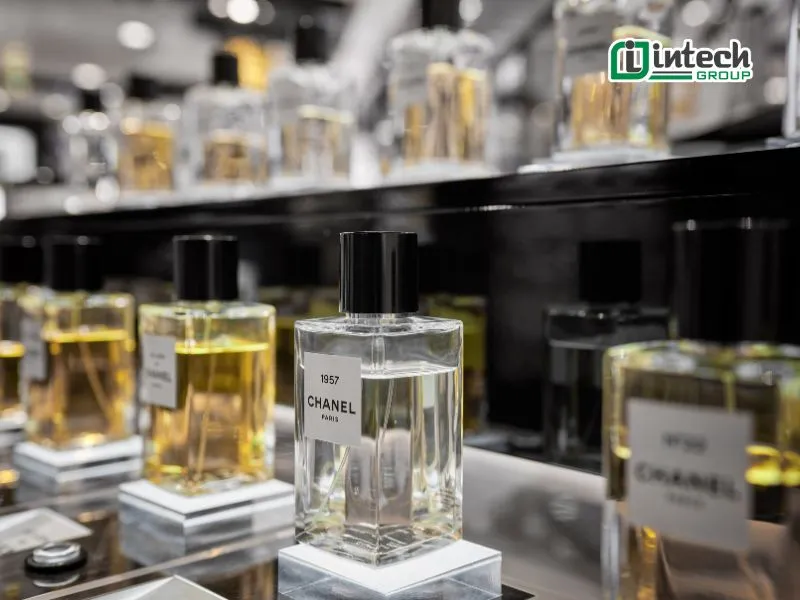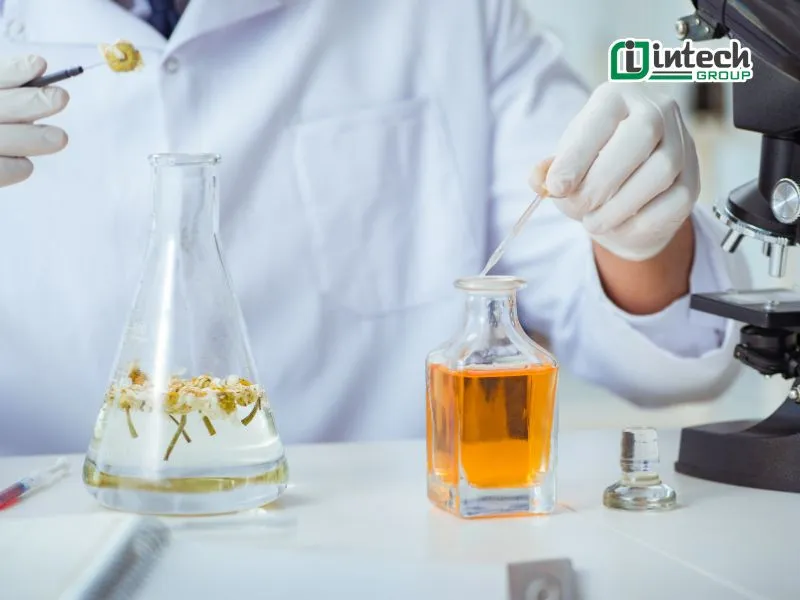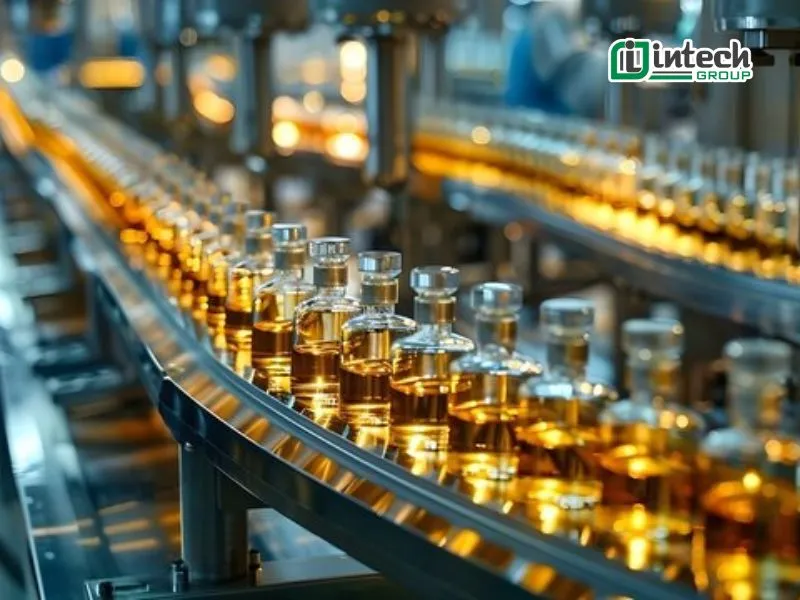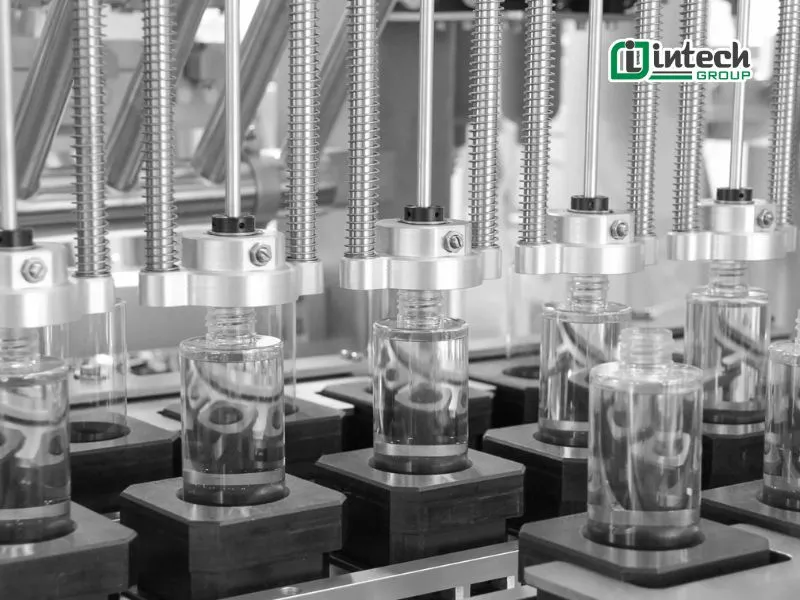6 stages in the perfume production line
12-08-2025 138
Perfume is not only a beauty product but also a symbol of style and sophistication. To create a quality bottle of perfume, manufacturers must go through a rigorous process with the support of modern technology. The perfume production line plays an important role in ensuring the consistency of the scent, quality and aesthetics of the product.
Mục lục
Let's explore the important stages in this process to better understand how a bottle of perfume is created.
What is a perfume production line?
A perfume production line is a system of equipment, machinery and technological processes designed to create perfumes automatically or semi-automatically. This process includes many important stages such as essential oil extraction, blending, fragrance incubation, filtering, filling, packaging and quality control.
Modern perfume production lines help ensure quality consistency, optimize productivity and minimize errors in the production process. Thanks to the application of advanced technology, manufacturers can create exquisite perfume products, meeting market demand with the highest standards.

Stages in the perfume production line
The perfume production line is a complex and sophisticated process, combining the art of fragrance preparation and modern production technology. Here are the main stages in this process:
- Formula Research and Development
The perfume production process begins with the formula research and development stage. Professional perfumers, also known as "perfumers", will:
- Select and blend natural essential oils and synthetic fragrances
- Test different formulas to create a unique and attractive scent
- Adjust the proportions of ingredients to achieve the perfect scent balance
- Ingredient Selection
The first stage in the perfume production line is the selection of ingredients. The main ingredients include essential oils from flowers, woods, fruits, herbs or synthetic fragrances. In addition, solvents such as ethanol and distilled water also play an important role in dissolving and diluting essential oils, creating a balance for the scent.
These ingredients are carefully selected to ensure purity and quality. For high-end brands, they can use special extraction methods such as steam distillation or cold pressing to preserve the natural scent.

- Perfume mixing
After having enough ingredients, the next step is to mix according to the researched formula. This process requires high precision to create a unique and harmonious scent.
Usually, a perfume formula includes:
- Top Notes: The initial scent layer, creating an impression right when sprayed, often including orange, lemon, mint, etc.
- Heart Notes: The core of the perfume, usually floral, spice or herbal scents.
- Base Notes: The scent layer that lasts the longest on the skin, can be sandalwood, vanilla, amber, musk, etc.
- Perfumers will combine these ingredients in precise proportions to achieve the desired scent.
- Maturation
After blending, the perfume mixture needs to go through a maturation period, which can last from several weeks to several months. This is an important step to help the ingredients blend together, making the scent more stable and long-lasting.
During this process, the perfume is stored in stainless steel tanks or dark glass bottles to avoid light and temperature changes that alter the scent.
- Filtration and purification
When the maturation process is complete, the perfume will be filtered to remove impurities, making the solution clearer and purer. Modern filtration technology such as micro-filters helps preserve the fragrance without affecting the quality of the product.
- Filling and packaging
The final step in the perfume production line is filling and packaging. This process is often automated to ensure accuracy and consistency.
- Filling: Perfume is pumped into glass bottles of different capacities (30ml, 50ml, 100ml…).
- Capping and sealing: After filling, the perfume bottle is tightly capped to prevent evaporation. Some brands also use special sealing technology to protect the product from environmental impacts.
- Labeling and packaging: The brand and product information are carefully printed, ensuring aesthetics and demonstrating the brand's class.
The perfume production line includes many important stages, from raw material selection, mixing, scenting, refining to filling and packaging. Each step requires precision and strict control to create high-quality perfume bottles that meet consumer needs.

Machinery in the perfume production line
To ensure consistent quality and optimize the process, modern perfume factories use many types of specialized machinery. These devices help increase productivity, reduce errors and ensure products are of the highest standards.
- Essential Oil Distillation and Extraction Machines
One of the most important elements that make up perfume is aromatic essential oils. These essential oils are extracted from flowers, wood, fruits, herbs using different methods.
- Steam distillation machine: Used to extract essential oils from plants by heating and condensing steam. This method helps to obtain pure essential oils without losing the natural fragrance.
- Cold press machine: Used to extract essential oils from orange, lemon, grapefruit peels and citrus fruits.
- Solvent extraction machine: Applied to materials that are sensitive to high temperatures, helping to retain the best scent.
- Perfume mixing machine
After having enough essential oils and fragrances, the perfume mixing process will take place in automatic mixing tanks.
- Automatic mixer: Helps to dissolve essential oils, solvents (usually ethanol alcohol) and aromatic compounds according to standard formulas.
- Temperature controller: Ensures the mixture is mixed at the right temperature, helping the ingredients blend better.
- Metering pump system: Helps to mix with precise proportions, ensuring each production batch has a consistent scent.
- Fragrance incubation system
After mixing, the perfume needs to go through a fragrance incubation stage so that the ingredients combine perfectly.
- Stainless steel tank: Used to preserve the perfume in stable conditions, avoiding light and high temperatures.
- Magnetic stirrer: Supports the fragrance incubation process by gently stirring, helping the fragrance molecules blend better.
- Perfume filter
Before bottling, the perfume needs to be filtered to remove impurities, ensuring purity.
- Micro-membrane filter: Helps remove dirt without affecting the quality of the scent.
- Vacuum filter: Applying air suction technology to help the perfume be transparent and uniform.
- Perfume Filling Machine
Filling is an important step in the production line, ensuring that each bottle of perfume has the correct capacity as specified.
- Automatic filling machine: Helps to pour perfume into the bottle with high precision, reducing material loss.
- Volume measuring machine: Ensures that each bottle contains the correct amount of perfume according to the standard (30ml, 50ml, 100ml ...).

- Capping and sealing machine
After filling, the perfume bottle needs to be capped and sealed carefully to protect the product quality.
- Automatic capping machine: Helps the bottle cap to be tightened without scratching the bottle.
- Shrink film sealing machine: Uses heat to seal the protective film, preventing perfume evaporation.
- Labeling and packaging machine
To make the product ready for consumers, the labeling and packaging stages are also automated.
- Automatic labeling machine: Print and label the bottle with high precision, ensuring the correct position and beauty.
- Boxing machine: Put the perfume bottle in the paper box, ensuring the aesthetics and protection of the product during transportation.
In summary
The perfume production line is a perfect combination of science and art, helping to create unique and attractive scents. Thanks to the development of technology, the production process is becoming more and more modern, efficient and meeting the strict standards of the market.
In the future, the perfume industry promises to continue to innovate, bringing high-quality products to meet the increasingly diverse needs of consumers.


